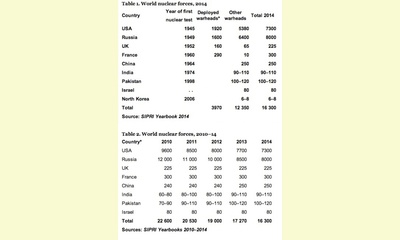|
|
Nuclear forces reduced while modernizations continue, says SIPRI
un article par Stockholm International Peace Research Institute
The Stockholm International Peace Research Institute (SIPRI) today
[16 June] launches its annual nuclear forces data, which assesses
the current trends and developments in world nuclear arsenals. The
data shows that while the overall number of nuclear weapons in the
world continues to decline, none of the nuclear weapon-possessing
states are prepared to give up their nuclear arsenals for the
foreseeable future. 
click on photo to enlarge
At the start of 2014 nine states—the United States, Russia, the
United Kingdom, France, China, India, Pakistan, Israel and North
Korea—possessed approximately 4000 operational nuclear
weapons. If all nuclear warheads are counted, these states together
possessed a total of approximately 16 300 nuclear weapons (see
table 1) compared to 17 270 in early 2013.
Over the past five years there has been a steady decline in the
overall number of nuclear warheads in the world (see table 2). The
decrease is due mainly to Russia and the USA—which together still
account for more than 93 per cent of all nuclear weapons—further
reducing their inventories of strategic nuclear weapons under the
terms of the Treaty on Measures for the Further Reduction and
Limitation of Strategic Offensive Arms (New START).
At the same time, all five legally recognized nuclear weapon states
—China, France, Russia, the UK and the USA—are either deploying
new nuclear weapon delivery systems or have announced
programmes to do so. India and Pakistan continue to develop new
systems capable of delivering nuclear weapons and are expanding
their capacities to produce fissile material for military purposes.
There is an emerging consensus in the expert community that
North Korea has produced a small number of nuclear weapons, as
distinct from rudimentary nuclear explosive devices.
(Click here for a Spanish version of this article or here for a French version.)
|








|
DISCUSSION
Question(s) liée(s) à cet article:
Can we abolish all nuclear weapons?,
* * * * *
Commentaire le plus récent:
'THE WORLD IS OVER-ARMED AND PEACE IS UNDER-FUNDED'
30 August 2012 — The following opinion piece by Secretary-General BAN Ki-moon has appeared in leading newspapers in Argentina, Bangladesh, Burundi, China, Germany, India, Iran, Italy, Japan, Lebanon, Malaysia, The Philippines, Republic of Korea, Russia, Serbia, Turkey, Ukraine and European weekly publications and has been translated into 10 languages.
Last month, competing interests prevented agreement on a much-needed treaty that would have reduced the appalling human cost of the poorly regulated international arms trade. Meanwhile, nuclear disarmament efforts remain stalled, despite strong and growing global popular sentiment in support of this cause.
The failure of these negotiations and this month's anniversaries of the atomic bombings at Hiroshima and Nagasaki provide a good opportunity to explore what has gone wrong, why disarmament and arms control have proven so difficult to achieve, and how the world community can get back on track towards these vitally important goals.
Many defence establishments now recognize that security means far more than protecting borders. Grave security concerns can arise as a result of demographic trends, chronic poverty, economic inequality, environmental degradation, pandemic diseases, organized crime, repressive governance and other developments no state can control alone. Arms can't address such concerns.
Yet there has been a troubling lag between recognizing these new security challenges, and launching new policies to address them. National budget priorities still tend to reflect the old paradigms. Massive military spending and new investments in modernizing nuclear weapons have left the world over-armed -- and peace under-funded.
Last year, global military spending reportedly exceeded $1.7 trillion – more than $4.6 billion a day, which alone is almost twice the UN's budget for an entire year. This largesse includes billions more for modernizing nuclear arsenals decades into the future.
This level of military spending is hard to explain in a post-Cold War world and amidst a global financial crisis. Economists would call this an "opportunity cost". . ... continuation.

|
|









